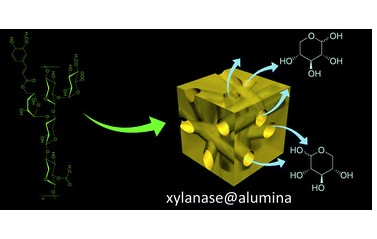Authors: Vinogradov V.V., Avnir D.

Abstract
We developed an alumina sol–gel matrix based on boehmite nanorods as a superior carrier for enzyme immobilization. Proteinase and xylanase were chosen for this study, as important representatives of industrially applied enzymes. For these two enzymes we observed exceptional thermal stability by entrapment within the alumina (enzyme@alumina). We show – using kinetics, DSC and CD analyses – that alumina holds strongly and thus keeps the native structures of the proteins, preventing unfolding at high temperatures. For instance, the activity of xylanase entrapped within alumina increases with temperature up to 80 °C (!), whereas being in solution or entrapped in silica drops the activities to zero at that temperature; whereas CD clearly shows that proteinase undergoes conformational changes above 30 °C, in the case of the entrapped enzyme, the ellipticity remains constant up to 90 °C. The importance of the nanoporosity of the nanorods derived alumina is shown for this superior stability. The findings open the door to potential new applications of these enzymes for high temperature organic syntheses.
DOI: 10.1039/c4ra10944a
Raed Full Here:
http://pubs.rsc.org/en/content/articlelanding/2015/ra/c4ra10944a#!divAbstract